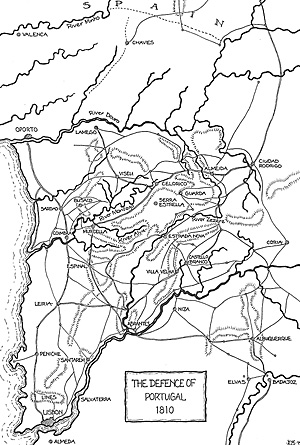
On 25 November 1808, Sir John Moore was asked by the
Secretary of State for War for his opinion on the practicality of
defending Portugal against the French. Moore, then the
Commander-in-Chief of the British Army in Spain and the man
considered by many to be Britain's most accomplished General,
answered: 'I can say generally that the frontier of Portugal is not
defensible against a superior force. It is an open frontier, all equally
rugged, but all equally to be penetrated. If the French succeed in
Spain it will be vain to attempt to resist them in Portugal. The
Portuguese are without a military force ... no dependence can be
placed on any aid that they can give. The British must in that
event, I conceive, immediately take steps to evacuate the country.
Lisbon is the only port, and therefore the only place from whence
the army, with its stores can embark .... We might check the
progress of the enemy while the stores are embarking, and
arrangements are being made for taking off the army. Beyond this,
the defence of Lisbon or of Portugal should not be thought of. [1]
Just four months later, after the death of Moore at Corunna,
Wellington - then still Sir Arthur Wellesley - answered the same
question put to him by the same minister, Lord Castlereagh. 'I have
always been of opinion that Portugal might be defended, whatever
might be the result of the contest with the French. My notion was
that the Portuguese military establishment ought to be revived, and
that in addition to these forces, 20,000 British troops should be
employed, including about 4,000 cavalry. My opinion was that,
even if Spain should have been conquered, the French would not be
able to overrun Portugal with a smaller force than 100,000 men. [2]
Wellington was given the opportunity to prove his theory
'unfettered by any particular instructions which might embarrass
him in the execution of his general plan of operations. [3]
His command of the British army gave him a free hand, and
almost unlimited powers over the Portuguese. With the eventual
control of the British subsidy to the Portuguese government,
Wellington began to put into effect one of the most extensive
defensive policies known to history.
To fully appreciate Wellington's plans, an examination of
the military geography of Portugal as it existed in 1810, and of the
current state of the Peninsular War, is essential.
French Invasion of Portugal Part 1: Wellington's Plans for the Defence of Portugal
More Portugal
Introduction
The Military Geography of Portugal
The Situation in 1810 and Fortresses
The Devastation of the Countryside and Footnotes
Part 2: Wellington's Plans for the Defense of Portugal
Massena's Invasion of 1810 Part 1
Massena's Invasion of 1810 Part 2
Back to Napoleonic Notes and Queries # 17 Table of Contents
Back to Age of Napoleon List of Issues
Back to MagWeb Master List of Magazines
© Copyright 1995 by Partizan Press.
This article appears in MagWeb (Magazine Web) on the Internet World Wide Web.
Other articles from military history and related magazines are available at http://www.magweb.com